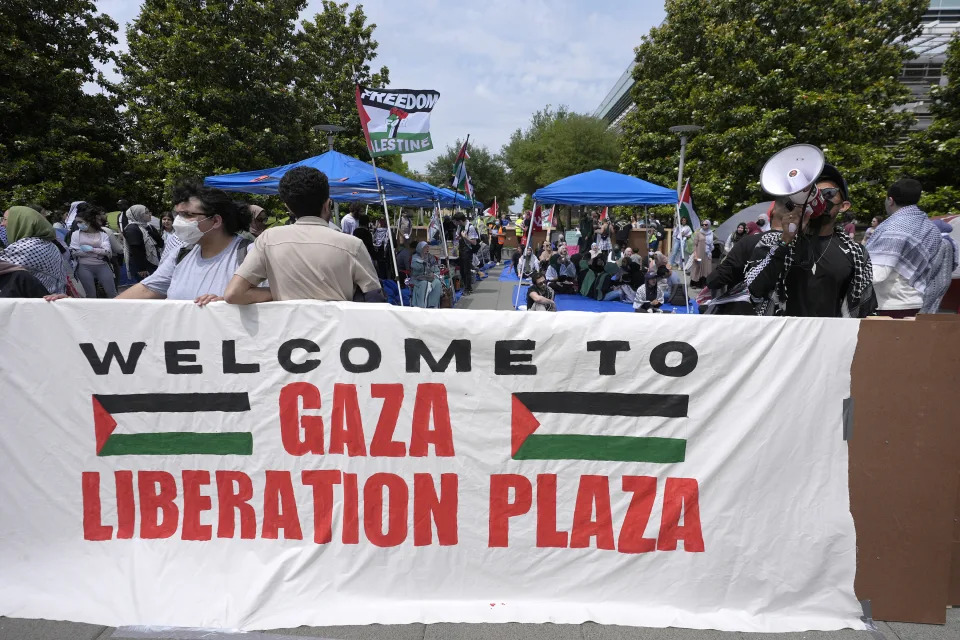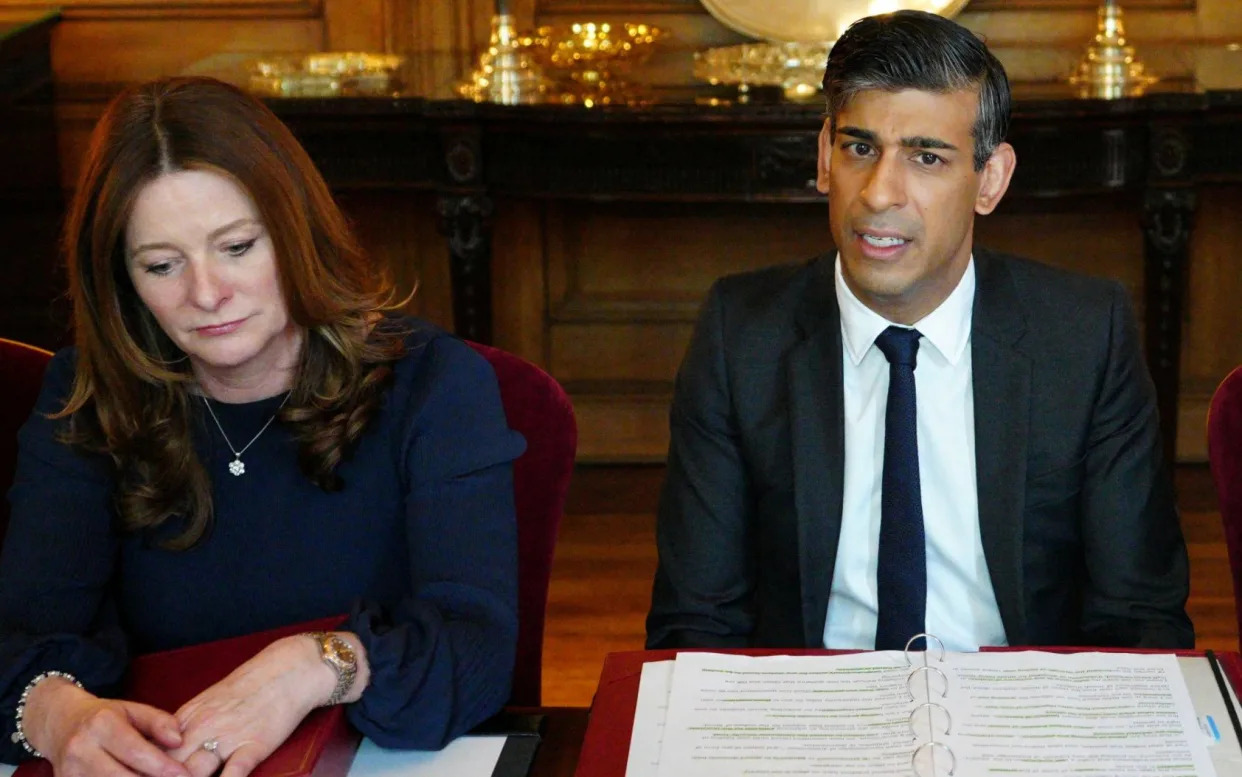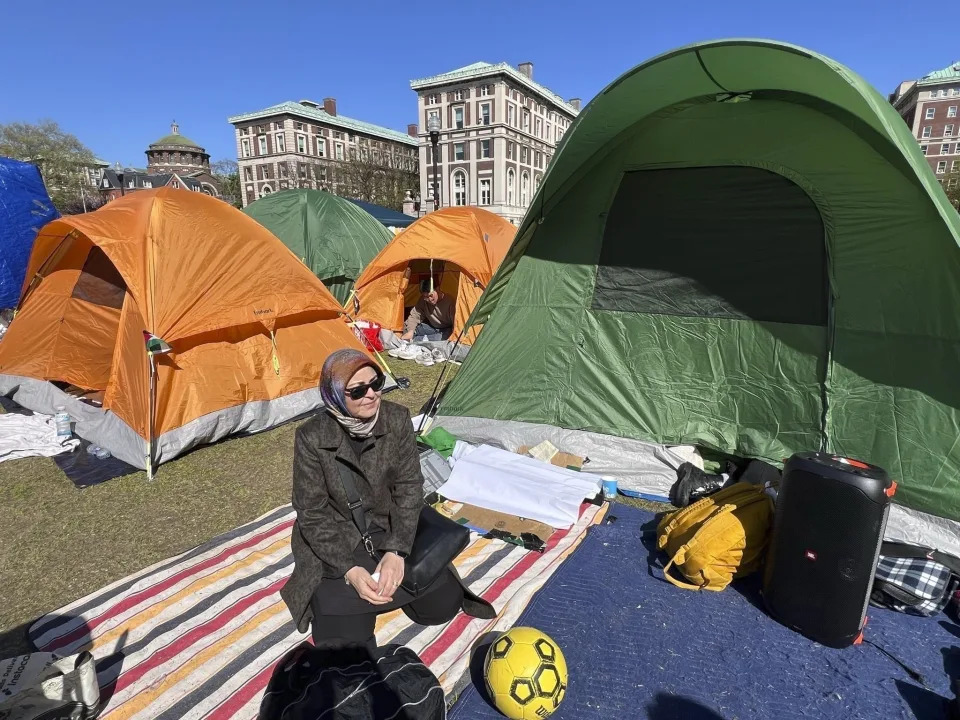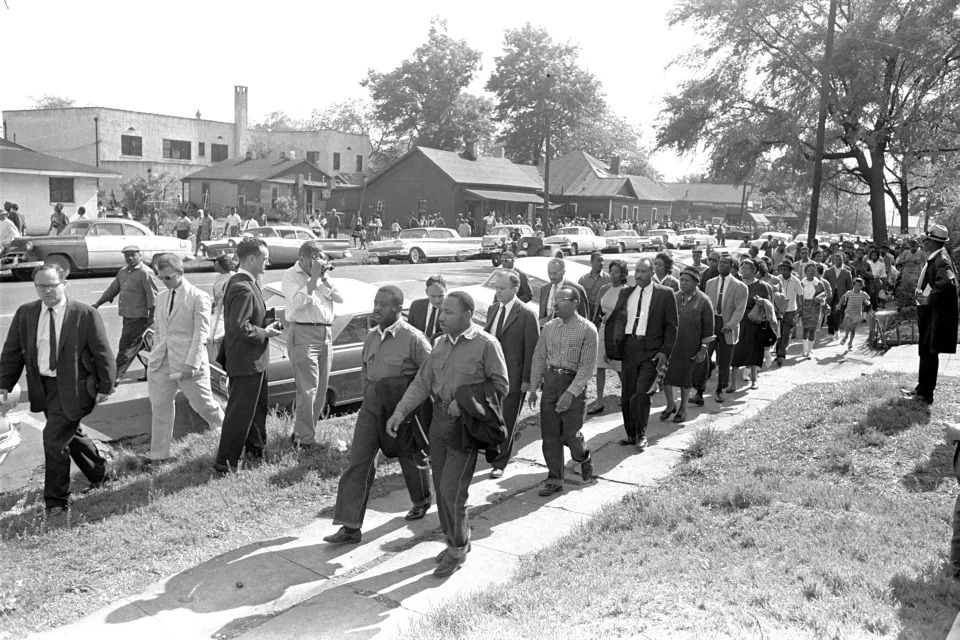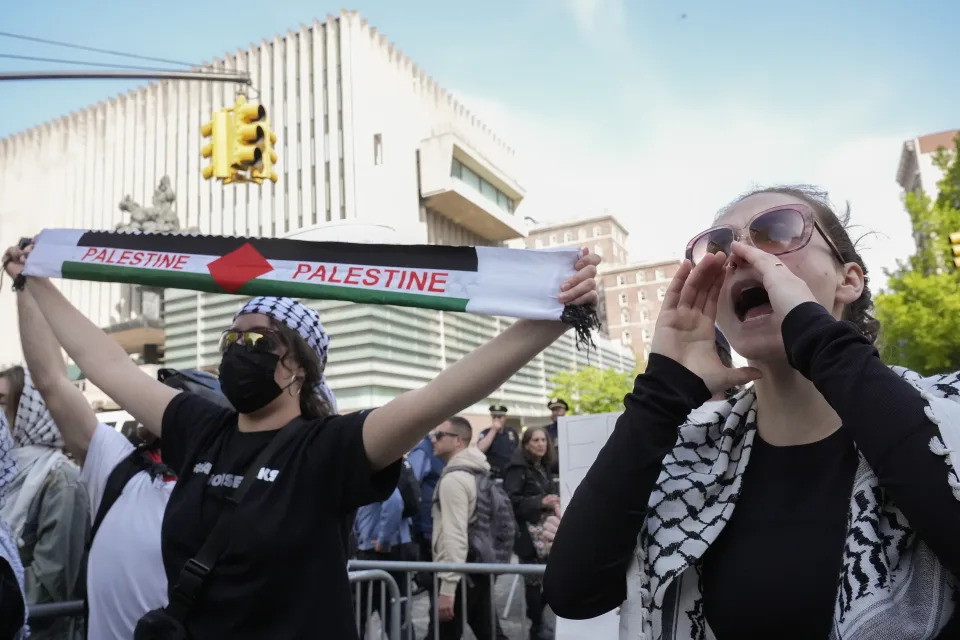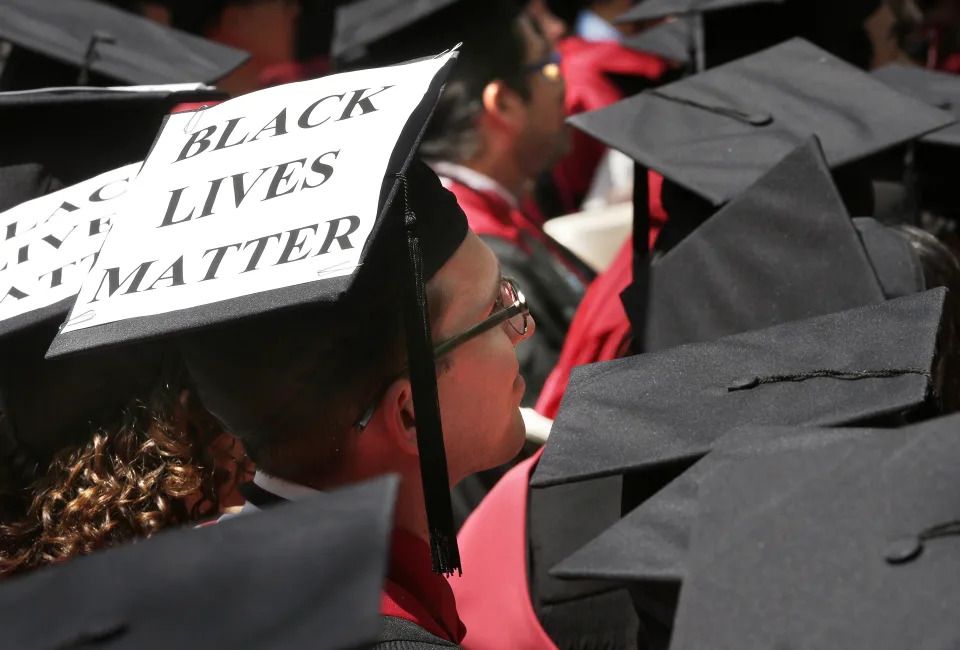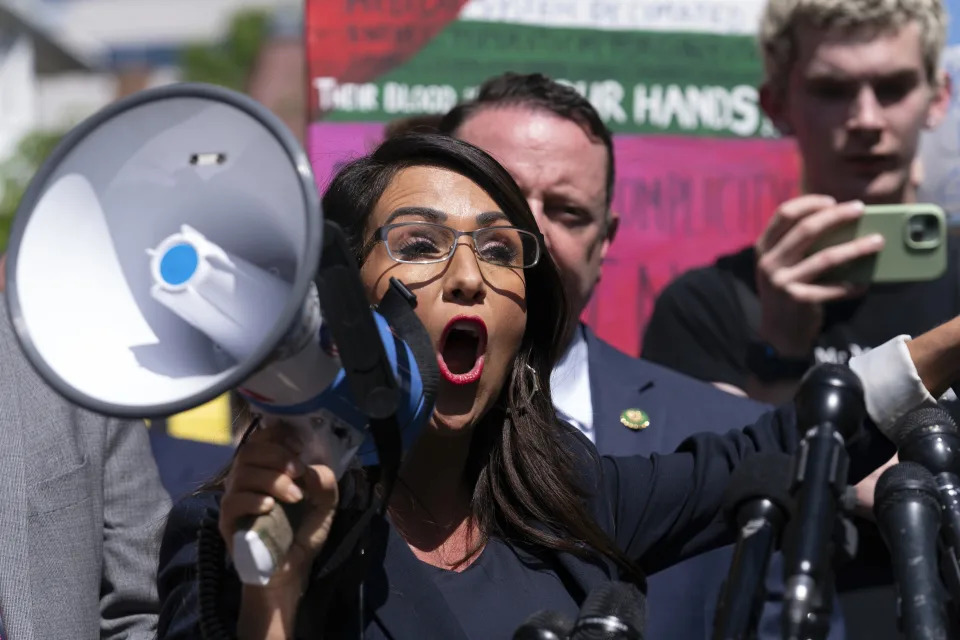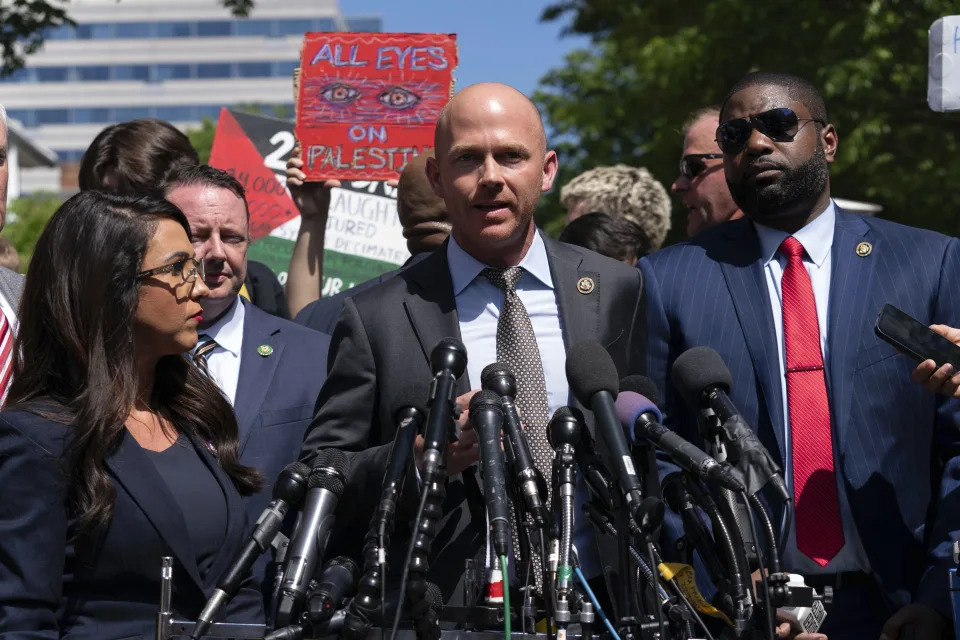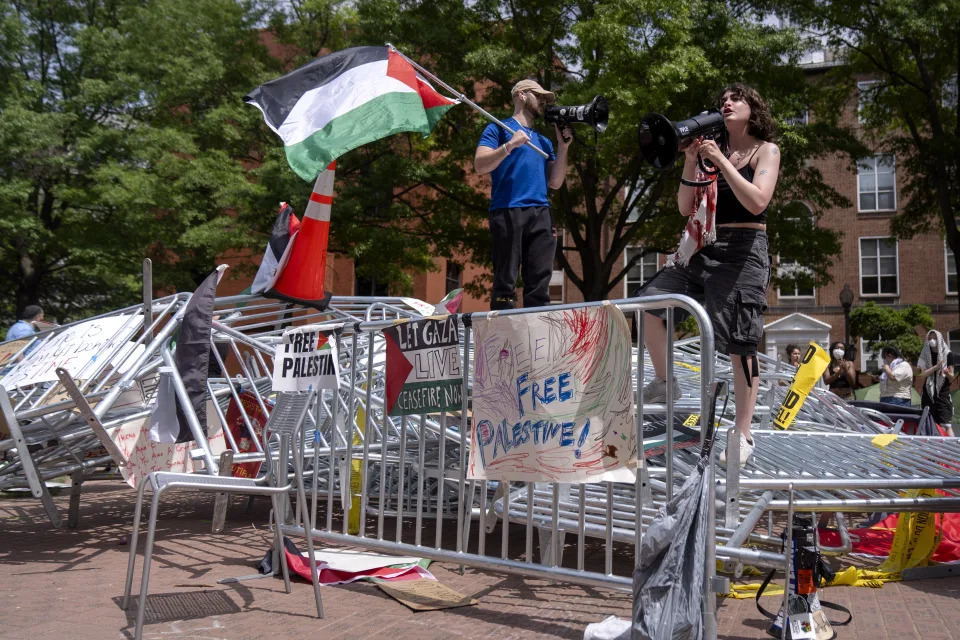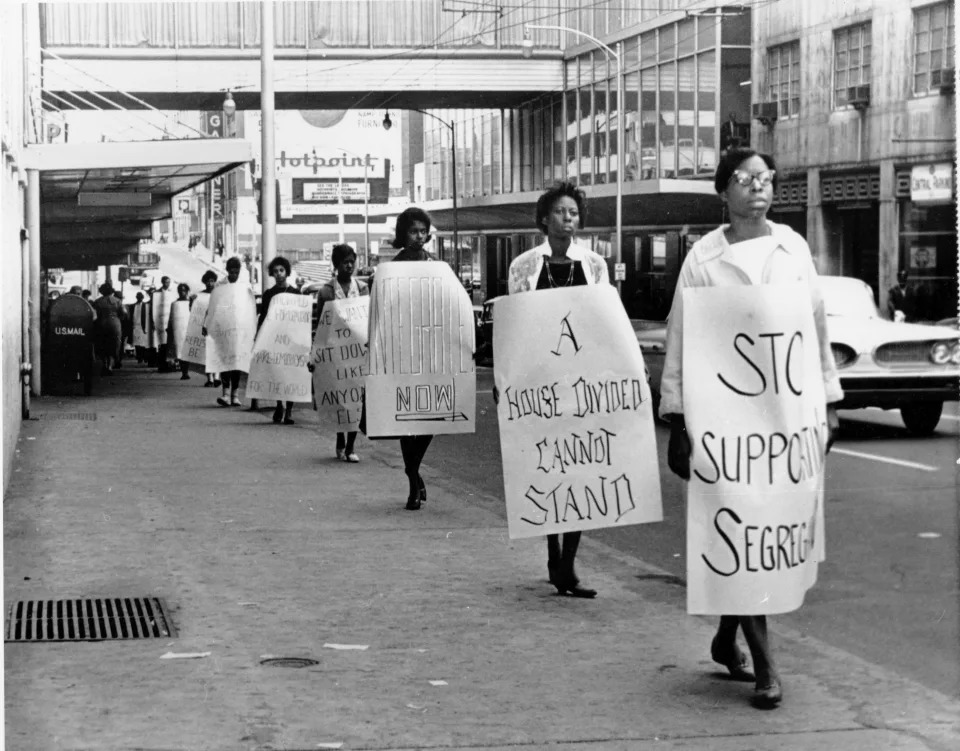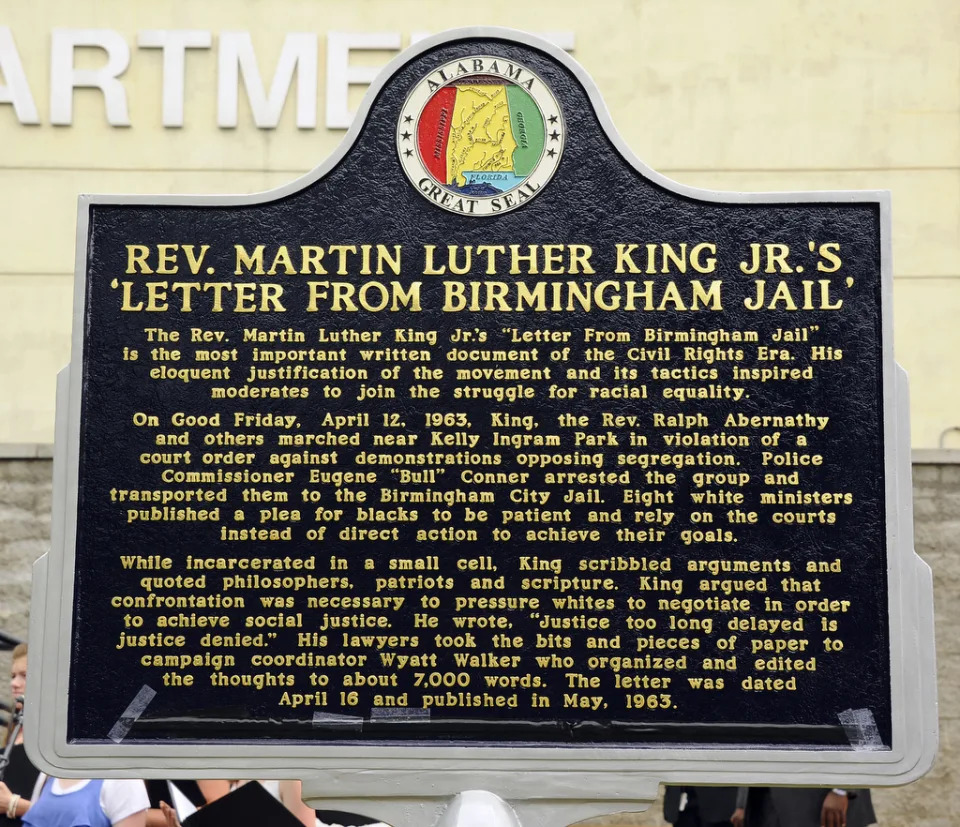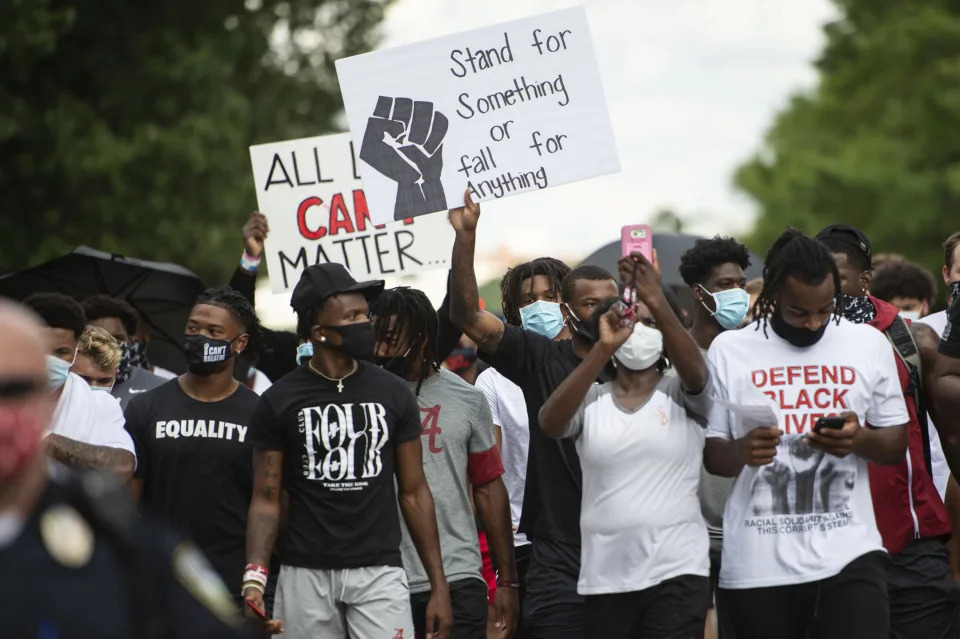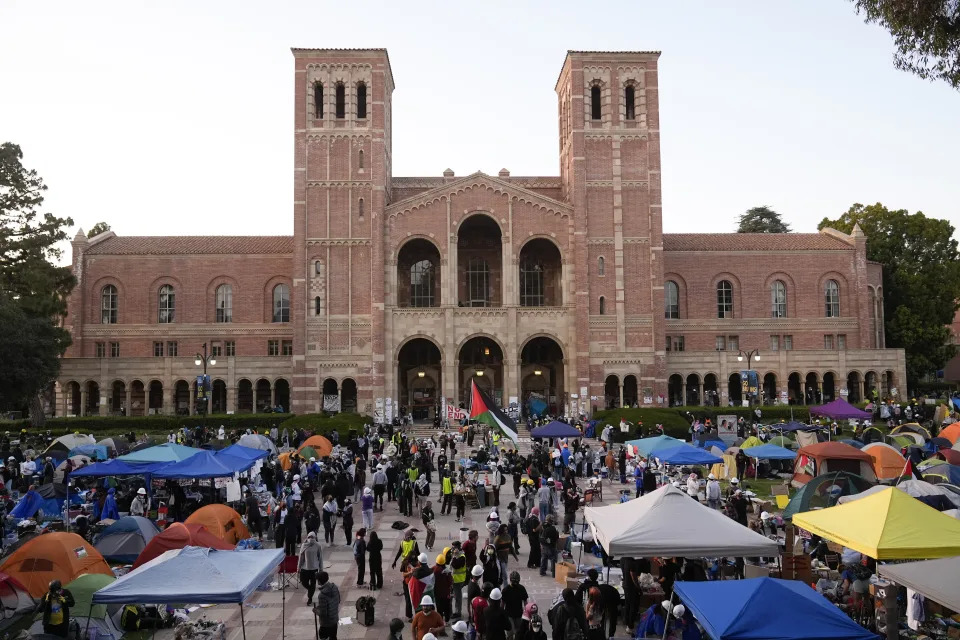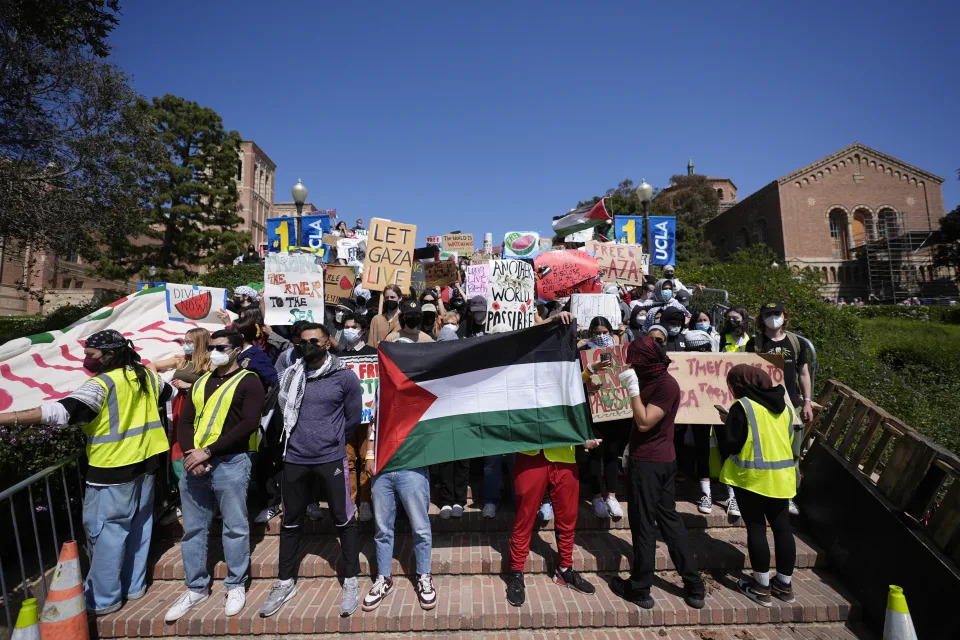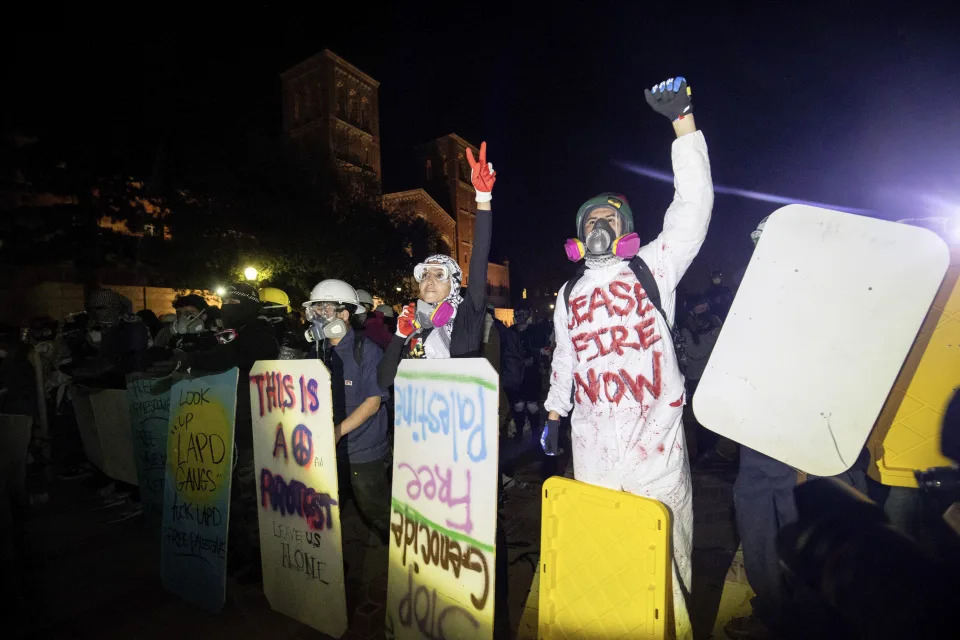Map: Where university protesters have been arrested across the United States
Alex Leeds Matthews, Krystina Shveda, Amy O'Kruk, Renée Rigdon and Lou Robinson, CNN
Fri, May 10, 2024
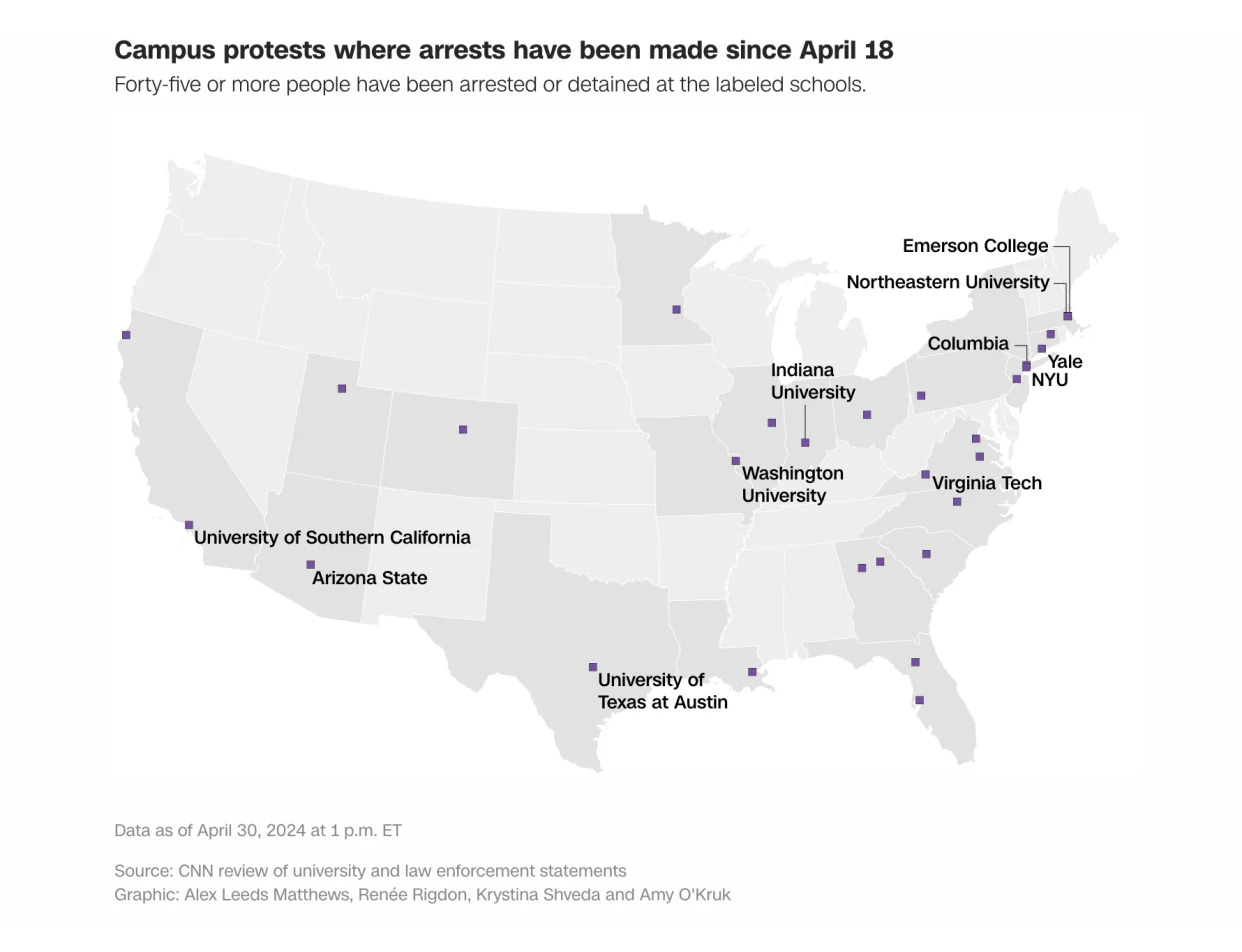
Map: Where university protesters have been arrested across the United States
As pro-Palestinian protests have erupted on college campuses nationwide, protesters — including students and faculty — continue to be arrested since the first demonstrators were detained at Columbia University three weeks ago. Nearly 200 protesters were arrested on May 7, the highest number of arrests in a day this week, according to a CNN review of university and law enforcement statements. April 30 saw the most arrests since protests began, with nearly 400 arrests.
More than 2,600 people have been arrested on college and university campuses since April 18 as schools prepare for spring commencement ceremonies, according to CNN’s review. The University of Southern California, where nearly 100 protesters were arrested April 24, canceled its primary commencement event. Protesters have been arrested on more than 50 campuses across at least 25 states and the District of Columbia. Many other schools have experienced protests without arrests.
Protest demands vary from campus to campus, but a major focus is that universities divest from companies with financial ties to Israel amid its war with Hamas. There have also been counter-protests, resulting in clashes at UCLA.
CNN is monitoring campus protests and will continue to update this map with any new arrests.
College Campus Protests: Students Arrested May Now Face Criminal Cases
Elizabeth Weill-Greenberg , Ethan Corey, Jerry Iannelli, Meg O’Connor
TEEN VOGUE
Fri, May 10, 2024
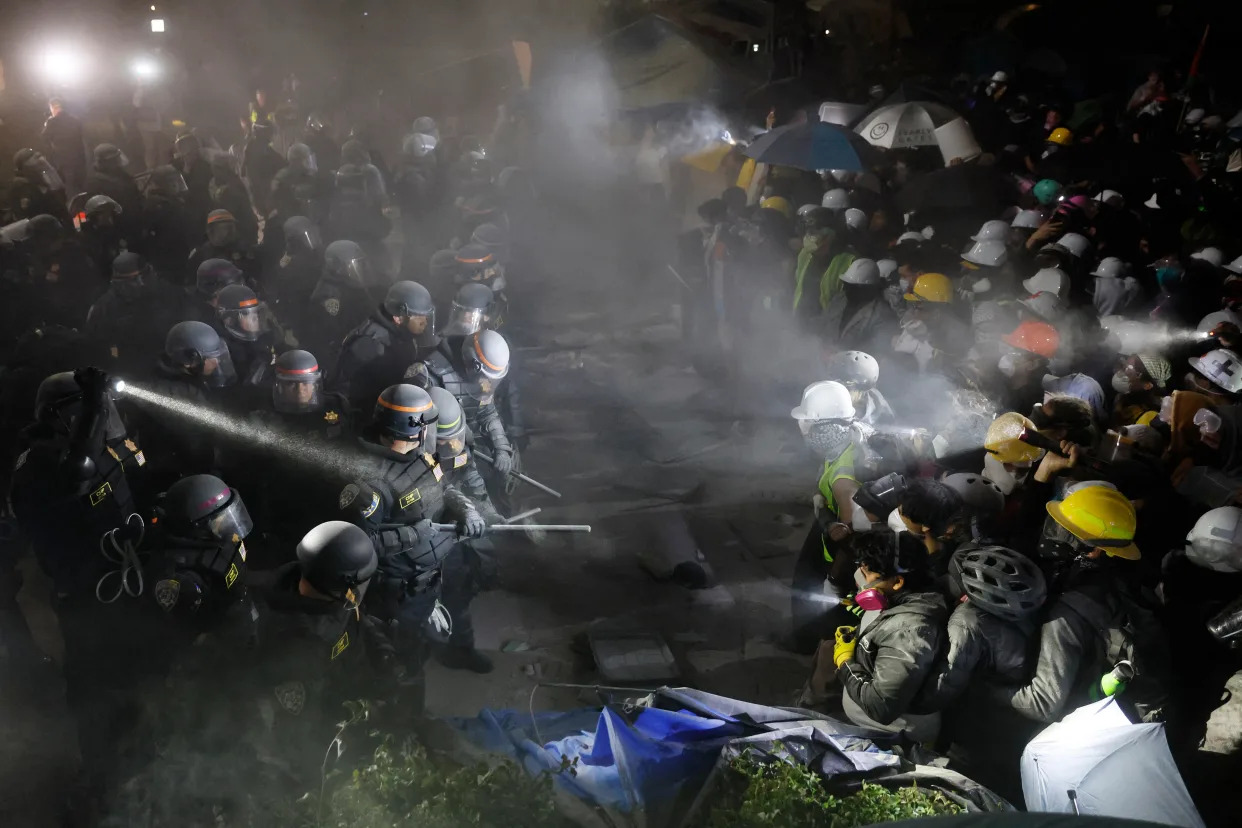
ETIENNE LAURENT/Getty Images
This story was originally published by The Appeal.
The Appeal is updating this tracker with new arrests and data on Thursdays.
American college students and staff are being arrested and brutalized by law enforcement across the U.S. for protesting Israel’s ongoing assault on the Gaza Strip. In moves that echo the repression of Vietnam War protesters more than 50 years ago, politicians and school administrators have sent police and state troopers on college campuses from New York to Texas to violently remove people camping on university grounds.
Based on The Appeal’s survey of local news reports and student newspapers, police have so far made nearly 3,000 arrests.
According to a nationwide review by The Appeal, students and their allies have built protest encampments or staged sit-ins on more than 100 college campuses across 39 states and the District of Columbia during the past few weeks. Protesters are demanding an end to U.S. military aid to Israel, that their schools divest from Israeli companies, and that Israel cease its attacks on Gaza, which have killed tens of thousands of Palestinians in what many humanrightsexperts and international organizations have called a genocide.
In many cases, the state has responded to those concerns with threats or outright violence—putting snipers on the roof of Indiana University, tear gassing students in Virginia, and physically assaulting people in Austin. The NYPD reportedly fired a gun inside a Columbia University campus building.
Los Angeles Police Department officers shot protesters in the face and chest with rubber bullets, sending several to the hospital, the Los Angeles Times reported. One demonstrator said on social media that he received 11 staples and four stitches in his head after police shot him in the face with a projectile. In New York, NYPD officers were photographed throwing a student down a flight of stairs. NYPD officers also sent several protesters to the hospital.
In Los Angeles, a crowd of Israel supporters violently attacked students at the University of California, Los Angeles encampment shows while police and campus security stood by, according to video footage captured by journalists present on Apr. 30. The Los Angeles Police Department (LAPD) confirmed there were no arrests that evening.
The next night, LAPD, California Highway Patrol, and other law-enforcement agencies fired rubber bullets at protesters, destroyed tents and other belongings, and arrested at least 209 pro-Palestinian demonstrators.
Despite peacefully protesting, students across the country still face severe consequences, including potential suspensions, evictions, expulsions, and criminal prosecutions. The latter depends on local prosecutors (or, in some cases, municipal city attorneys) who often have broad leeway to file—or drop—charges after someone is arrested.
New York Police Department officers have arrested more than 600 protesters in Manhattan alone—almost a fourth of the national total. Yet Manhattan’s top prosecutor, Alvin Bragg, has not responded to multiple requests for comment regarding how he will handle the deluge of cases.
At least 86 different prosecutors—and 31 smaller city-level offices—are responsible for prosecuting crimes on the various campuses. The Appeal asked prosecutors’ and city attorneys’ offices in every jurisdiction that includes a university encampment if they plan to prosecute or dismiss charges against protesters.
Forty-three offices responded. As of May 8, only four prosecutors said they would not charge people for peacefully protesting.
“This office is not interested in prosecuting people for exercising their First Amendment rights,” a spokesperson for Sam Bregman, the prosecutor for Bernalillo County, New Mexico, stated. Bregman’s jurisdiction includes the University of New Mexico’s Albuquerque campus, where police arrested 16 people for trespassing and wrongful use of public property on Apr. 29.
In Cook County, Illinois—where Chicago police recently arrested 68 protesters at the Art Institute of Chicago for trespassing—the county’s top prosecutor also told The Appeal she would not prosecute individuals for charges related to peaceful protest.
“The Cook County State’s Attorney’s Office recognizes peaceful protesting as a fundamental First Amendment Right,” state’s attorney Kim Foxx’s office said in an email. “Established in 2020, our Protest-Related Charging Policy ensures that individuals engaging in peaceful protests will not face prosecution.”
Matthew Van Houten, the prosecutor overseeing Cornell University in Ithaca, New York, offered a similar statement.
“As a general policy, I have stated that the Tompkins County DA’s Office will not prosecute students, faculty, and other demonstrators who are arrested during protests,” he said via email.
In Ulster County, New York, where police arrested 133 people for trespassing at the State University of New York at New Paltz, District Attorney Emmanuel Nneji said he fully supports free speech and “encourages the use of these rights to oppose human indignities and atrocities.”
In some jurisdictions, law enforcement officials have already levied serious criminal charges against people. New Orleans Police Department officers arrested three people for battery on a law enforcement officer, committing “hate crimes” against law enforcement, and resisting an officer with force—the latter of which could land a person in prison for one to three years. In Georgia, a professor whose brutal arrest was caught on camera was charged with battery on a police officer. In Florida, some students were reportedly charged with “wearing a hood or mask on public property,” a law initially enacted in 1951 to crack down on the Ku Klux Klan.
At least one office, that of Travis County Attorney Delia Garza, has already dropped charges against 57 people arrested during protests on the University of Texas at Austin campus on Apr. 25. But, since then, police in Texas have arrested nearly 80 more people. One photojournalist from Fox 7 Austin had been arrested on felony charges of assaulting an officer, but that case has since been dropped.
Of the total number of prosecutors, 26 are running for office in 2024.
The map below lists the protests identified by The Appeal. Hover or click on the dots to see each prosecutor’s response. You may also search for specific encampments in the search bar.
A Flourish map
Campuses where arrests have occurred:
Arizona State University in Tempe, Arizona
Campus police arrested 72 people for trespassing on Apr. 26, according to a statement from the university.
Maricopa County Attorney Rachel Mitchell’s office told The Appeal: “The courts, not the County Attorney, makes the decision whether probable cause exists in these cases; the court also sets what it believes is appropriate bail. No charging decisions have been made yet. I take this situation very seriously and intend to continue to monitor each case closely. The people involved must be held accountable for their actions.”
Mitchell is running for reelection this year.
Northern Arizona University in Flagstaff, Arizona
Police arrested 24 people for trespassing on Apr. 30, according to local news.
Coconino County Attorney Bill Ring did not respond.
University of Arizona in Tucson, Arizona
A team of four police departments arrested at least four people on charges of criminal trespassing and aggravated assault on an officer on Apr. 30, local news reported. Officers fired tear gas and rubber bullets at protesters.
Pima County Attorney Laura Conover’s office told The Appeal: “Every charging decision we make is made on a case-by-case basis. The specific facts of each case, and the applicable law, will determine if charges are appropriate. PCAO has neither charged nor dismissed charges against any individual who has taken part in campus protests at this time.”
Conover is running for reelection this year.
University of New Mexico in Albuquerque, New Mexico
State and campus police arrested 16 people for trespassing and wrongful use of public property on Apr. 29, a university spokesperson told local media.
Prior to the arrests, Bernalillo County District Attorney Sam Bregman’s office told The Appeal: “This office is not interested in prosecuting people for exercising their First Amendment rights.”
Bregman is running for reelection this year.
University of Texas at Austin, Texas
The Travis County Sheriff’s Office arrested 57 people on Apr. 25, local news reported. Those charges were all dropped. University police and Texas Department of Public Safety troopers arrested an additional 79 people on Apr. 29, according to local news.
Police arrested Fox 7 Austin photojournalist Carlos Sanchez for allegedly assaulting a police officer. Sanchez’s charges were reportedly dropped on Apr. 30.
Travis County Attorney Delia Garza, whose office prosecutes some misdemeanors, told The Appeal that charges from the 57 arrests on Apr. 25 have been dismissed. “The Travis County Attorney’s Office received several cases yesterday and throughout the evening as a result of yesterday’s demonstration at the University of Texas,” Garza’s office said. “Legal concerns were raised by defense counsel. We individually reviewed each case that was presented and agreed there were deficiencies in the probable cause affidavits. The Court affirmed and ordered the release of those individuals. We will continue to individually review all cases presented to our office to determine whether prosecution is factually and legally appropriate. Final count is 57 arrested on criminal trespass. All 57 lack sufficient probable cause to proceed.”
Both prosecutors are running for reelection this year.
University of Texas at Dallas, Texas
State troopers and campus police arrested 20 people for trespassing on May 1, according to local news reports.
Dallas County District Attorney John Creuzot’s office previously told The Appeal: “We have no comment.”
University of Houston in Houston, Texas
Campus police arrested two people for failure to identify, resisting arrest, assault on a police officer on May 8, local news reported.
Harris County District Attorney Kim Ogg’s office told The Appeal: “We don’t comment on hypothetical cases or situations. All cases are evaluated by our office based on their merits at the time of their presentation.”
The Harris County District Attorney is up for election this year, but Ogg has already lost her reelection bid.
Washington University in St. Louis, Missouri
On Apr. 27, 100 people were arrested on charges of trespassing, resisting arrest, and assault, the university said.
Police were filmed severely beating a professor.
St. Louis County Prosecuting Attorney Wesley Bell did not respond.
Bell is running to unseat incumbent U.S. Congress member Cori Bush. Bell said he was inspired to run against her due to her criticism of Israel and he has been endorsed by the American Israel Public Affairs Committee (AIPAC), among other groups.
Auraria Campus in Denver, Colorado
Denver and Auraria Campus police arrested roughly 40 people on trespassing charges at a protest on Apr. 26, local news reported.
Denver District Attorney Beth McCann did not respond.
University of Utah in Salt Lake City, Utah
A team of five police departments arrested 19 people on Apr. 29, according to a university statement.
Salt Lake County District Attorney Sim Gill’s office told The Appeal: “We are monitoring the situation on the University of Utah campus. We have not yet had anything submitted to our office related to last night’s protest and arrests.”
University of Minnesota in Twin Cities, Minnesota
Campus police arrested nine people on trespassing charges on Apr. 23, local news reported.
Hennepin County Attorney Mary Moriarty said she believes the arrests were for misdemeanor trespassing, which is prosecuted by the city attorney, not the county attorney.
Minneapolis City Attorney Kristyn Anderson did not respond.
University of Wisconsin-Madison in Madison, Wisconsin
University of Wisconsin-Madison police, Wisconsin State Patrol, the Dane County Sheriff’s Office, and the Madison Police Department arrested 34 people on May 1, according to a statement from the university. Many were released with no citation, the university said, but four were charged with attempting to disarm a police officer, resisting arrest, attempted escape, and battery to a police officer.
Dane County District Attorney Ismael Ozanne has not yet responded.
Madison City Attorney Michael Haas’s office previously told The Appeal: “We have not had any discussions about a blanket policy related to arrests of protesters. It is also not a certainty that those cases would be referred to us as the Dane County District Attorney prosecutes criminal cases. Also, the University of Wisconsin has its own police department and its cases are usually referred to the District Attorney. The demonstration on campus here only started yesterday and we have not received any referrals.”
Ohio State in Columbus, Ohio
Ohio State Police and campus police arrested 41 people for trespassing on Apr. 26, local news reported.
Franklin County Prosecuting Attorney G. Gary Tyack said the charges are misdemeanors and will be handled by the city attorney’s office, not his.
Columbus City Attorney Zach Klein told The Appeal: “As with any criminal case brought to our office, we will review the facts on a case by case basis to determine if there is sufficient evidence to proceed with criminal prosecution. The same is true for those charged out of the student protests. Our office will review the cases and charges filed. There has been no determination yet on how we will proceed.”
Case Western Reserve University in Cleveland, Ohio
Campus police detained 22 people on Apr. 29, according to local media.
Cuyahoga County Prosecutor Michael O’Malley’s office directed The Appeal to contact the City of Cleveland Prosecutor’s Office.
O’Malley is running for reelection this year.
Cleveland City Prosecutor Aqueelah Jordan’s office told The Appeal: “We are unaware of any arrests being made. Our office evaluates the facts, evidence and circumstances of each case brought before us on an individual basis. There have been no arrests or police reports for college students, faculty or staff presented to our office related to protests on college campuses, thus no charges have been filed or dismissed. We believe in the exercise of constitutional rights including the First Amendment right to free speech. We also believe in public safety and following the law. We will continue to support the exercise of students, faculty and staff first amendment rights within the confines of content neutral time manner and place restrictions. We will not offer an opinion or charging or not charging a matter without the full presentation of evidence to make an informed Constitutional decision.”
University of Kansas in Lawrence, Kansas
Campus police arrested one person for interference with law enforcement on May 7, local news reported.
Douglas County District Attorney Suzanne Valdez did not respond.
Valdez is running for reelection this year.
Indiana University in Bloomington, Indiana
Indiana University Police and Indiana State Police arrested 33 people on Apr. 25. Indiana State Police arrested an additional 23 people on Apr. 27, bringing the total number of arrests to 56. The charges include trespassing and resisting law enforcement, local news reported.
Regarding the first 33 arrests, Monroe County Prosecuting Attorney Erika Oliphant’s office told The Appeal: “They were released on their own recognizance and given a promise to appear for June. In the meantime, we will examine all the reports we receive and any relevant footage to determine what, if any, charges are appropriate.”
University of Notre Dame in Notre Dame, Indiana
Campus police arrested 17 people for trespassing and resisting law enforcement on May 2, according to local news.
St. Joseph’s County Prosecuting Attorney Ken Cotter did not respond.
Wayne State University in Detroit, Michigan
Campus police arrested one person for disorderly conduct after students interrupted an Apr. 26 university meeting to demand the school divest from Israel, local news reported.
Wayne County Prosecutor Kym Worthy’s office told The Appeal: “The police can issue tickets for ordinance violations that would typically be handled by the City of Detroit’s Corporation Counsel. I am not aware that we have received any cases in our office. If that changes, I have asked to be alerted.”
Worthy is running for reelection this year and is unopposed.
Detroit Corporation Counsel Conrad Mallet did not respond.
University of Michigan in Ann Arbor, Michigan
Michigan State Police arrested one person on May 3, local news reported.
Washtenaw County Prosecuting Attorney Eli Savit did not respond.
Savit is running for reelection this year.
The Art Institute of Chicago in Chicago, Illinois
The Chicago Police Department arrested 68 people for trespassing on May 4, local news reported.
Cook County State’s Attorney Kim Foxx’s office told The Appeal: “The Cook County State’s Attorney’s Office (CCSAO) recognizes peaceful protesting as a fundamental First Amendment Right. Established in 2020, our Protest-Related Charging Policy ensures that individuals engaging in peaceful protests will not face prosecution. We work closely with our law enforcement partners to ensure that residents can exercise their rights while also maintaining public safety for all.”
University of Illinois in Urbana-Champaign, Illinois
Campus police arrested two people on Apr. 26. Both have been charged with felony “mob action,” according to local news.
Champaign County State’s Attorney Julia Rietz did not respond.
Rietz is running for reelection this year and is unopposed.
Emory University in Atlanta, Georgia
Georgia State Patrol arrested at least 28 people on Apr. 25, local news reported. The charges include criminal trespassing, disorderly conduct, and obstruction of law enforcement officers, among others. A professor whose brutal arrest was caught on camera was charged with battery on a police officer.
DeKalb County District Attorney Sherry Boston’s office told The Appeal: “At this time, our office has not yet received any of these cases. If and when we do, we will review them carefully, as we would any other case received in our office. It should be noted that we only handle felony cases, so depending on the charges, we may not have any involvement.”
Boston is running for reelection this year.
The DeKalb County Solicitor General Donna Coleman-Stribling prosecutes some misdemeanors. Coleman-Stribling’s office told The Appeal: “We are in the process of investigating each of the cases we have received related to the Emory protests. Once the investigation is completed, we will decide whether formal charges should be filed regarding these arrests.”
Coleman-Stribling is running unopposed for reelection in 2024.
University of Georgia in Athens, Georgia
Campus police arrested at least 16 people for trespassing on Apr. 29, local news reported.
Athens-Clarke County Solicitor General Will Fleenor prosecutes misdemeanors. His office has not responded.
Athens-Clarke County District Attorney Deborah Gonzalez prosecutes felonies. Gonzalez’s office told The Appeal: “Thank you for reaching out to our office regarding this issue. The answer to your question is no because these arrests were related to misdemeanor charges. The Solicitor General’s Office is handling any charges related to these arrests.”
Gonzalez is running for reelection this year.
George Washington University in Washington, D.C.
Washington, D.C. police arrested 33 people after officers moved to clear a pro-Palestinian encampment on campus, according to news reports. Charges for protesters include assault on a police officer and unlawful entry.
Attorney General for the District of Columbia Brian Schwalb did not immediately respond to a request for comment on Thursday following those arrests.
His office previously told The Appeal: “Everyone has the right to protest peaceably under both federal and DC laws. However, there are places in DC where the right to protest may be limited, and the right to protest does not protect violence or civil disobedience. When arrests are presented to our office, we evaluate them and make a charging decision based upon the facts and the law in each individual case, as well as the public safety risks to DC residents. As of right now, we are not aware of any arrests in DC related to Gaza protests.”
University of Mary Washington in Fredericksburg, Virginia
Campus police arrested 12 people for trespassing on Apr. 27, according to the university.
Commonwealth’s Attorney Libby K. Humphries did not respond.
Virginia Tech in Blacksburg, Virginia
Campus police arrested 82 people for trespassing on Apr. 28, local news reported.
Commonwealth’s Attorney Mary Pettitt did not respond.
Virginia Commonwealth University in Richmond, Virginia
Campus, Richmond, and state police arrested 13 people for unlawful assembly and trespassing on Apr. 29, local news reported.
Police tear-gassed protesters.
Richmond Commonwealth’s Attorney Colette McEachin did not respond.
University of Virginia in Charlottesville, Virginia
Campus police and Virginia State Police arrested 25 people for trespassing on May 4, according to the university.
Commonwealth’s Attorney Joseph Platania did not respond.
University of North Carolina in Chapel Hill, North Carolina
Campus police detained around 36 people on Apr. 30 on charges including trespassing, the university told local media.
Orange County District Attorney Jeff Nieman’s office previously told The Appeal: “We would take each charge on a case-by-case basis, but we would not categorically dismiss charges stemming from protest-related arrests. We have had no such protest-related charges so far.”
North Carolina State University in Raleigh, North Carolina
Police arrested one person on trespassing charges, local news reported.
Wake County District Attorney Lorrin Freeman did not respond.
University of South Carolina in Columbia, South Carolina
Campus police arrested two people on Apr. 23 for breaching the peace, local news reported.
Fifth Judicial Circuit Solicitor Byron Gipson did not respond.
University of Tennessee in Knoxville, Tennessee
Campus police and Knoxville Police Department officers arrested 9 people for trespassing on May 2, according to local news.
Knox County District Attorney General Charme Allen did not respond.
Tulane University and Loyola University in New Orleans, Louisiana
The New Orleans Police Department (NOPD) said it arrested 12 people after clearing an encampment in Jackson Square, local news reported. The charges include trespassing, hate crime on law enforcement, aggravated battery on a police officer, resisting an officer by force or violence, and interfering with a law enforcement investigation, according to an NOPD statement.
Tulane University police, Louisiana State Police, and the NOPD arrested an additional 14 people at Tulane for trespassing on Apr. 30, according to a statement from the university.
Orleans Parish District Attorney Jason Williams’s office told The Appeal they have “no on record statement regarding these matters” and asked to speak off the record, which The Appeal declined.
University of South Florida in Tampa, Florida
Campus police arrested three people on Apr. 29, according to local news.
Police tear-gassed protesters and arrested 10 additional people on Apr. 30 for unlawful assembly, trespassing, resisting an officer, aggravated assault with intent to commit a felony with a weapon, possession of a firearm on school property, and battery on a law enforcement officer local news reported.
Thirteenth Judicial District State Attorney Suzy Lopez did not respond.
Lopez is running for reelection this year.
University of Florida in Gainesville, Florida
Campus police and Florida Highway Patrol arrested nine people on Apr. 29. The charges include failure to obey a lawful command, resisting without violence, trespassing, battery on a law enforcement officer, and wearing a hood or mask on public property, local news reports.
Eighth Judicial District State Attorney Brian Kramer did not respond.
Kramer is running for reelection this year.
Florida State University in Tallahassee, Florida
Florida State University police arrested five people on Apr. 30, according to student activists.
Second Judicial Circuit State Attorney Jack Campbell did not respond.
Portland State University in Portland, Oregon
Portland Police and campus police arrested 30 people on May 2, according to local news.
Multnomah County District Attorney Mike Schmidt did not respond to The Appeal, but he previously told local media: “I expect that felony charges could be filed depending on what evidence we gather, including burglary and felony, criminal mischief along with other potential misdemeanors.”
Schmidt is running for reelection this year.
San Diego State University in San Diego, California
Campus police, California Highway Patrol, and the San Diego County Sheriff’s Department arrested 64 people for unlawful assembly on May 6, local news reported.
San Diego County District Attorney Summer Stephan’s office directed The Appeal to the city attorney’s office. San Diego City Attorney Mara Elliot’s office said it had not yet received any cases from the May 6 arrests.
California State Polytechnic University in Humboldt, California
Humboldt County Sheriff’s deputies and campus police arrested 35 people on Apr. 30, according to a statement from the university. Charges include unlawful assembly, vandalism, conspiracy, assault on police officers, and others.
Humboldt County District Attorney Stacey Eads did not respond.
University of Southern California in Los Angeles, California
The Los Angeles Police Department arrested 93 people for trespassing on Apr. 25, local news reported.
Los Angeles District Attorney George Gascón’s office told The Appeal on Apr. 25 they had not received any cases against student protesters, and protest cases are typically charged as misdemeanor trespassing, which would be prosecuted by the city attorney, not the county attorney.
Gascón is running for reelection this year.
Los Angeles City Attorney Hydee Feldstein Soto’s office told The Appeal on May 2: “Our office has not received any submissions from law enforcement arising out of the protests at USC or UCLA for consideration.”
University of California in Los Angeles, California
The Los Angeles Police Department, California Highway Patrol, campus police, and other law enforcement arrested at least 210 protesters while breaking up a protest encampment on the night of May 1 and morning of May 2, according to news reports. Many were reportedly booked for failing to disperse. A day earlier, roughly two dozen protesters were hospitalized after Israel supporters attacked the encampment. The attackers were not arrested.
Campus police and the Los Angeles Sheriff’s Department arrested an additional 43 people for conspiracy to attempt burglary on May 6, according to news reports.
Los Angeles District Attorney George Gascón’s office told The Appeal on May 2: “The Los Angeles City Attorney is responsible for the prosecution of misdemeanors in the city of Los Angeles. Please direct all questions regarding misdemeanor offenses to the LACA. The Los Angeles County District Attorney’s Office is responsible for the prosecution of felony crimes. As of [May 2], law enforcement has not presented any UCLA cases to our office. When law enforcement presents a case to our office, we apply the law to the facts of each case and determine what charges, if any, are appropriate. Please direct any questions regarding arrests to law enforcement.”
Gascón is running for reelection this year.
City Attorney Hydee Feldstein Soto’s office told The Appeal on May 2: “Our office has not received any submissions from law enforcement arising out of the protests at USC or UCLA for consideration.” Her office has not responded to further messages.
New York University in Manhattan, New York
The NYPD arrested 120 people on Apr. 22. Inside Higher Ed reported that 116 were released with summonses for trespassing while the other four face charges of resisting arrest and obstructing government administration. NYPD arrested an additional 13 people on May 3, according to news reports.
Manhattan District Attorney Alvin Bragg did not respond.
Columbia University in Manhattan, New York
The NYPD arrested 108 people for trespassing on Apr. 18, according to news reports. The NYPD arrested an additional 112 people for trespassing, burglary, and criminal mischief on April 30, local news reported.
Manhattan District Attorney Alvin Bragg did not respond.
City College of New York in Manhattan, New York
Organizers say school police officers arrested a woman and charged her with a felony.
Manhattan District Attorney Alvin Bragg did not respond.
The New School in Manhattan, New York
The NYPD arrested 43 people on May 3, according to news reports.
Manhattan District Attorney Alvin Bragg has not responded to multiple requests for comment.
Fordham University in Manhattan, New York
The NYPD arrested 15 people for trespassing on May 1, according to local news.
Manhattan District Attorney Alvin Bragg did not respond.
Fashion Institute of Technology in Manhattan, New York
NYPD officers arrested 50 people on May 8, local news reported.
Manhattan District Attorney Alvin Bragg did not respond.
University at Buffalo in Buffalo, New York
Campus police, Buffalo police, Amherst police, the Erie County Sheriff’s Office, and state police arrested 15 people for loitering, trespass, disorderly conduct, and resisting arrest on May 1, according to the university.
Erie County District Attorney Michael Keane’s office told The Appeal: “Our office only releases information after a defendant has been arraigned. All of the individuals arrested at University at Buffalo last night were issued appearance tickets to be arraigned on June 4, 2024 in Amherst Town Court. To our knowledge, all except one of the accused have been charged with non-criminal violations. Our office does not prosecute violations outside of Buffalo City Court. Violations will be handled by the Amherst town prosecutor. One individual, who was charged with Resisting Arrest (Class “A” misdemeanor) and Loitering (violation), was issued an appearance ticket to be arraigned in Amherst Town Court on May 29, 2024.”
Keane, who was appointed acting district attorney in March, is running for election to a full term this year.
The Amherst Town Prosecutor’s Office did not respond.
Stony Brook University in Stony Brook, New York
Campus police, Suffolk County police, and state police arrested 29 people on May 2, according to local news.
Suffolk County District Attorney Raymond Tierney did not respond.
State University of New York at New Paltz, New York
State Police, State University Police, Ulster County Sheriff’s Office, and New Paltz Police Department arrested 133 people for trespassing on May 2, according to local news.
Ulster County District Attorney Emmanuel Nneji’s office told The Appeal: “I completely support the free exercise of free speech and association. I wholeheartedly encourage the use of these rights to oppose human indignities and atrocities anywhere they occur. I encourage our young and old, students and all, to abide the law and the rights and interests of others, whether or not they are sympathetic to your cause, as you push for a better today and tomorrow for everyone. Even as we disagree about any particular issue, we must first recognize and accept the right of everyone to be safe, including peaceful protesters and police officers. All those arrested are entitled to the presumption of innocence and due process, including the assurance that they are entitled to, and are guaranteed, fair treatment from the Office of the Ulster County District Attorney.”
State University of New York at Purchase, New York
University police, Westchester County Police, and New York State Police arrested more than 70 people for trespassing on May 2, according to local news.
Westchester County District Attorney Miriam Rocah’s office told The Appeal: “We are waiting for the arrests to be processed to evaluate the facts and evidence, as we do in all cases.”
Emerson College in Boston, Massachusetts
Boston police arrested 108 people. Arraignments for the more than 200 total protesters arrested in Boston are underway.
Suffolk County District Attorney Kevin Hayden’s office told The Appeal: “We don’t comment on arraignments before they occur.”
Northeastern University in Boston, Massachusetts
University police arrested 97 people on Apr. 27. At least one student’s criminal trespassing charges have already been dismissed, local news reported.
Suffolk County District Attorney Kevin Hayden’s office told The Appeal: “We don’t comment on arraignments before they occur.”
University of Massachusetts in Amherst, Massachusetts
Campus police arrested 134 protesters on May 7, local news reported.
Northwestern District Attorney David Sullivan’s office told The Appeal: “We will take these case by case as they come through the court system. As of yet, none have come through court. That will happen starting next week.”
University of New Hampshire in Durham, New Hampshire
Campus police arrested 12 people for trespassing and disorderly conduct on May 1, according to local news.
Strafford County Attorney Emily Garod’s office told The Appeal: “Like any case referred to us for prosecution, we will evaluate the evidence for each case and if charges are warranted we will work to resolve the case for an appropriate resolution. Currently only the assault cases are being handled by my office with the trespass and disorderly cases being handled by the police department’s prosecutor, which is typical. To my knowledge none of the charges filed against anyone last night have been dismissed.”
Garod is running for reelection this year.
Dartmouth College in Hanover, New Hampshire
Hanover Police and New Hampshire state troopers arrested 90 people for trespassing and resisting arrest on May 1, according to Hanover police.
Assistant Grafton County Attorney Mariana Pastore declined to press charges against two student reporters who were arrested on May 1 while covering the encampment.
Grafton County Attorney Martha Ann Hornick did not respond.
University of Connecticut in Storrs, Connecticut
Campus police arrested one person on Apr. 26. He was charged with interfering with an officer, local news reported.
Campus police arrested an additional 23 people on Apr. 30 for disorderly conduct and criminal trespassing, student protesters told local news.
Tolland Judicial District State’s Attorney Matthew Gedansky did not respond.
Yale University in New Haven, Connecticut
Campus police arrested 48 people for trespassing on Apr. 22, according to a statement from the university president. Campus police arrested another four protesters for trespassing, disorderly conduct, and interfering with a police officer on May 1, according to local media.
The State Attorney for New Haven’s Judicial District, John P. Doyle, Jr., did not respond.
Princeton University in Princeton, New Jersey
Campus police arrested two people on trespassing charges on Apr. 25, local news reported. Thirteen more people were arrested for trespassing on Apr. 29, local news reported.
Mercer County Prosecutor Angelo J. Onofri’s office told The Appeal: “There are many offenses someone could be charged with that would be handled in Municipal Court and would never reach the prosecutor’s office—disorderly persons offenses such as trespassing, failure to disperse, simple assault. Only indictable charges, such as aggravated assault, would reach our office for review. I have no specific knowledge of any protesters being charged with indictable offenses in our jurisdiction.”
University of Pittsburgh in Pittsburgh, Pennsylvania
Police arrested two people for trespassing on Apr. 29, a university spokesperson told local media.
Allegheny County District Attorney Stephen Zappala did not respond.
A handful of other prosecutors with protests in their districts—but no arrests so far—are running for reelection or higher office this year.
They are:
Ingham County Prosecuting Attorney John Dewane (Lansing, Michigan)
Kalamazoo Prosecuting Attorney Jeff Getting (Kalamazoo, Michigan)
Milwaukee County District Attorney John Chisholm (Milwaukee, Wisconsin)
Tompkins County District Attorney Matthew Van Houten (Ithaca, New York)
Missoula County Attorney Matt Jennings (Missoula, Montana)
Other prosecutors whose jurisdictions currently have protests, but no arrests, made statements to The Appeal regarding their intent to prosecute protesters.
Tompkins County District Attorney Matthew Van Houten’s office (New York): “As a general policy, I have stated that the Tompkins County DA’s Office will not prosecute students, faculty and other demonstrators who are arrested during protests. As a matter of common sense, there are limits to that general policy – obviously if an individual commits violence against another person or causes property damage we will ask the police to conduct a full investigation and will make a decision on a case by case basis how to handle that conduct. We have offered adjournments in contemplation of dismissal in an earlier case this year.”
Cumberland County District Attorney Jacqueline Sartoris’s office (Maine): “I do not have any pro forma policy concerning protest engagements. We review reports on a case-by-case basis. We take into account the specifics as well as the totality of the situation and factors we would consider in reviewing any potential case. I should note that last year NSC-131 marched in Portland. The group verbally engaged with counter protesters then committed what appeared to be a violent one-sided assault. However, in part because officers were practicing de-escalation, did not anticipate sudden violence, and because witnesses initially refrained from cooperation, we did not have the evidence needed to identify and charge the perpetrators. The counter protester suffered an apparent concussion. We will continue to review these matters on a case-by-case basis notwithstanding the subject matter of any protest.”
Bexar County District Attorney Joe Gonzales’ office (Texas): “Currently, the Bexar County District Attorney’s Office has not received any protest arrest cases to date. Should a case be filed with our office, it will undergo a thorough review by our office.”
Alameda County District Attorney Pamela Price’s office (California): “To answer these questions, please provide the names of anyone arrested during the incidents related to your inquiry.”
Rhode Island Attorney General Peter Neronha’s office: “If the police make arrests for disorderly conduct or other misdemeanor offenses, those prosecutions would be handled by the Providence City Solicitor’s Office in the first instance. This Office handles felony prosecutions and misdemeanor appeals. To our knowledge, no charges have yet been brought. We cannot answer hypothetical questions regarding arrests that have not yet been made. Any further questions should be directed to the City of Providence.”
Santa Clara County District Attorney Jeff Rosen’s office (California) “We don’t have any such cases. Nor do we have a blanket policy about protests. We review every case through the same lens and ask the same questions: Was there a crime? Do we know who committed the crime? Can we prove it to a jury unanimously and beyond a reasonable doubt? Is prosecution the right thing to do?”
Correction: A previous version of this article incorrectly identified the prosecutor responsible for criminal cases at Washington University in St. Louis. The earlier version also misstated the title of Travis County Attorney Delia Garza.
This is a breaking story. This post will be updated. This post was last edited on Thursday, May 9, 2024, at 2:30 P.M. PST.
The Appeal is a nonprofit newsroom that exposes how the U.S. criminal legal system fails to keep people safe and perpetuates harm.




